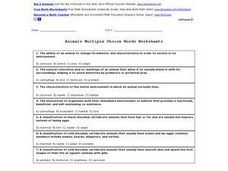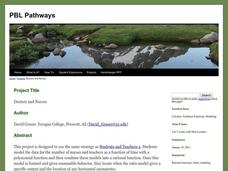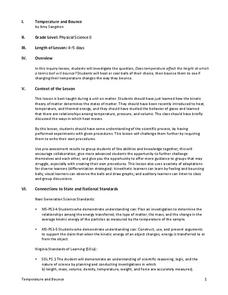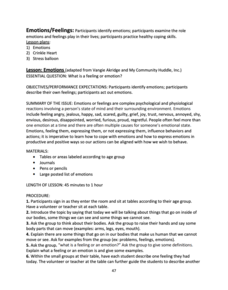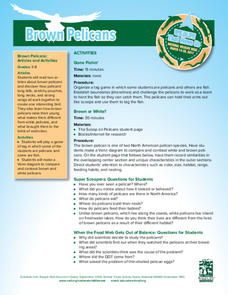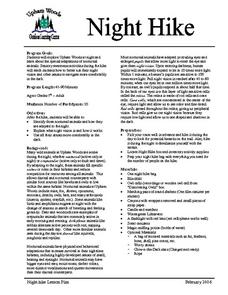Curated OER
Animals Multiple Choice Words Worksheet
Looking for some simple multiple-choice questions for an upcoming biology unit on animals? This worksheet features 7 clearly worded questions, each with 4 possible answers. Topics include adaptation, camouflage, ecosystems, animal...
Curated OER
Reading the River - Biological Classification
Youngsters create a list of grocery store items and then work together to categorize them as if they were setting up the shelves of the market. Then they are given a box of miscellaneous objects to practice categorizing. With these two...
University of Kentucky
The Great Spider Debate
Poor, misunderstood spiders! They are feared, disrespected, and detested by many people, yet they do so many positive things. A great addition to any insect unit, learn about some of the more common spiders, while hopefully dispelling...
Colorado State University
What Is a "Model"?
Model the transfer of energy during a typical 24-hour period. Young scholars use a game-like approach to learning the patterns of heat transfer through the day and night. Groups of four exchange different tokens as the energy transfers...
Creative Learning Exchange
The Infection Game: The Shape of Change
Encourage the spread of knowledge in your class with this cross-curricular epidemic simulation. Pulling together science, social studies, and math, this lesson engages students in modeling the spread of infectious diseases, collecting...
PBL Pathways
Doctors and Nurses
How many nurses does it take to support one doctor? A project-based activity asks learners to analyze state data to answer this question. Classes create polynomial functions from the data of doctors and nurses over a seven-year period....
STEM for Teachers
Temperature and Bounce
Take part in a fun experiment and hold an impromptu bouncing contest with your class. Young scientists heat and cool balls before bouncing them to determine whether temperature changes affect how they bounce. The set of STEM lesson plans...
San Diego County District Attorney
Emotions/Feelings
Three lessons delve deep into the topic of feelings and the importance of expressing one's emotions. Through grand conversation, hands-on learning experiences, and reflective writing, scholars interpret the ups and downs of everyday...
Curated OER
Creating Classroom Rules
Perfect for establishing classroom protocols, this activity gets even the youngest learners thinking about rules and their consequences. The lesson begins with a discussion and a reading of the poem Humpty Dumpty that gets youngsters...
Rainforest Alliance
Colombia Biodiversity
How diverse is the rainforest? How much more diverse is a rain forest than a temperate forest? Explore these focus questions in a lesson that explores the plants, animals, and insects in forests. After listening to a reading about...
National Wildlife Federation
Brown Pelicans
Even animals that are part of the same species have differences. Learners read a passage about white and brown pelicans and compare their features. They recognize that although the birds look very similar, they also have their own unique...
Howard Hughes Medical Institute
Winogradsky Columns: Microbial Ecology in the Classroom
Winogradsky columns are ideal for observing the role of bacteria and other microorganisms in an ecosystem. This student activity guide is complete with data tables for observations and analysis questions for processing what was observed....
Curated Video
Reporting - Flagging
While it may feel like you can post just about anything on YouTube, that's not the case. Teach your class about flagging inappropriate content. Learners watch a demonstration, practice flagging, and answer questions about online content.
University of North Florida
Family Child Care Home Instructional Unit: My Community
As Mister Rogers would say, "It's a beautiful day in this neighborhood," especially when youngsters know all about community helpers and their role in the community. These two units, one designed for ages two to three and the other for...
University of Southern California
How do Organisms Interact?
Examine how organisms interact through a hands-on experience. Learners study population dynamics and distribution during an informative five-lesson unit. The focus is on the ocean environment and the organisms within it.
Howard Hughes Medical Institute
How Animals Use Sound to Communicate
Communication involves the visual, auditory, olfactory, and tactile senses. Scholars observe groups of animals communicating through multiple senses. They note and learn why different species use different senses depending on their...
California Department of Education
What’s A Hot Job?
What jobs are the next best thing? Curious career scholars explore their options in activity three of a five-part series. Pupils research job trends and labor statistics before discussing the factors that influence occupation trends.
California Department of Education
Ready, Set, Test!
Ready to prepare young scholars for their first placement test experience? Give them the support they need using a test-focused instructional activity. Fifth in a series of six junior-level college and career readiness instructional...
California Department of Education
In the Interview Hot Seat
Interviews can be so stressful. How does someone stay calm and confident in the interview hot seat? Senior job seekers get acquainted with common interview questions during the fifth of six career and college readiness lessons....
California Department of Education
My Best Resume
For employers and recruiters, the first step in their quest to find good candidates is the paper screening process. They look at a candidate's application and resume and push forward the files of those who meet their requirements. Thus...
Curated OER
Night Hike
Students explore Upham Woods at night and investigate about the special adaptations of nocturnal animals. They identify three nocturnal animals and how they are adapted to the night. Students explain what night vision is and how it works.
Curated OER
Blocks And Screws (or "screwy Contrivances")
Young scholars, given a block of wood and a screw or nail, are asked to put that screw or nail into a block. They examine how many contrivances and other imperfections found in living things are best explained by the process of evolution.
Curated OER
Primate Evolution
For this primate evolution worksheet, students will compare 3 characteristics that all primates share. Then students will compare the traits of current primates to early man by completing 5 short answer questions.
Curated OER
Roll or Attendance
Students stand for roll call in designated spots painted by the teacher. They stand on the alphabet, numbers, periodic table, and keyboard.


